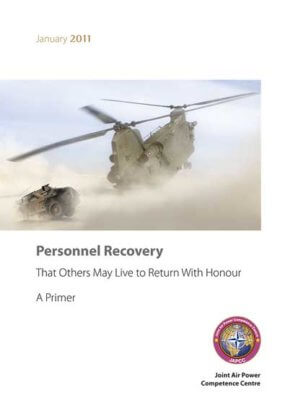Introduction
Throughout history, armies traditionally fought the wars whilst government officials, explorers and tourists travelled and worked all over the globe. During war, travel or exploration, individuals may have become isolated from their group, or the group itself may be lost or fall victim to some disaster with no possibility of making it to safety. From a military perspective, the isolation, capture and/or exploitation of personnel during operations can have a significant negative impact on operational security, the morale of assigned forces and on public support. This is particularly true in the current information age where everything we do can and will be recorded on television and the Internet.
The consequences for isolated personnel have not gone unnoticed. There are many initiatives, national as well as multi-national, in the field of Personnel Recovery (PR). However, whilst many of these initiatives may be known to a wider audience, most are limited to a small group of Subject Matter Experts (SMEs). There has however been a significant increase in interest in the development of PR.
Aim
The aim of this Primer is to provide an insight into the history of PR and to pursue a common global standard; to highlight the current complexities with stand-alone national policies; and to suggest changes necessary for a collaborative approach.
This document first provides a history of PR. It then describes the current status of conceptual developments before finally providing ideas for the way forward.
What is Personnel Recovery?
Before continuing on, it is essential for the reader to have a clear understanding of what constitutes PR and how it differs from other forms of recovery and / or rescue. For the purposes of this document the following definitions are used:
Personnel Recovery: The sum of military, diplomatic and civil efforts to effect the recovery and reintegration of isolated personnel.
The above is to be proposed as the definitive for both NATO and the European Union (EU). It means that every effort will be made to recover people, for whom one is responsible, back to safety once they find themselves in difficulties. This definition purposely does not limit the resources that can be utilized during the recovery effort.
Isolated Personnel: Military or civilian personnel who are separated from their unit or organisation in a situation that may require them to survive, evade, resist exploitation, or escape while awaiting recovery.
This definition is also proposed to become the formal definition for both NATO and the EU. It means that if one is unable to continue the mission and cannot be returned through pre-planned arrangements, he or she may be considered to be isolated. This is obvious in the case of aircrew who have been forced to eject from their aircraft. However, one may also be considered to have become isolated if the vehicle one drives has run out of fuel or is forced to stop due to any kind of malfunction or accident, whether or not through human intervention.
Scope and Limitation
National and International. This Primer addresses initiatives in the field of PR, both nationally and internationally. The JAPCC is aware of initiatives within NATO and the EU in addition to initiatives in the Pacific region. However, this document is by no means prescriptive.
Non-conventional Assisted Recovery and Hostage Rescue. With Non-conventional Assisted Recovery (NAR), Special Operations Forces (SOF) and / or insurgents are employed to recover isolated personnel; SOF are again employed, alongside diplomatic and civil means, during Hostage Rescue. Both NAR and Hostage Rescue are normally considered part of PR. However, within NATO, it has been decided that NAR and Hostage Rescue sit within SOF doctrine rather than PR doctrine. Moreover, Hostage Rescue is usually considered a national task rather than at the NATO / EU force level. NAR and Hostage Rescue are therefore considered outside of the scope of this document.
Other Personnel. As previously stated, PR is about recovering one’s own personnel, i.e. people for whom one has a responsibility. As a minimum this includes the military and civilian personnel that constitute the National / NATO / EU force. The force commander should also be aware of, and consider, all participants within the operational theatre that are not subordinate to the force commander (e.g. members of Non-Governmental Organisations (NGOs), Other Governmental Departments (OGDs), reporters etc.). Dependent upon the number of ‘other’ personnel, the techniques and procedures used to recover them may be the same or similar in nature. The separate recovery of other personnel is therefore not included in the scope of PR unless the Operation Plan (OPLAN) for the operation states otherwise. Support to outside agencies should be provided under the umbrella of a Non-combatant Evacuation Operation (NEO).
Recovering Equipment. Recovering equipment may, in certain cases, be considered as important as recovering personnel. The techniques used to recover equipment may be considered to be the same or similar to the recovery of personnel. Nevertheless, the principle (moral) differences between recovering personnel and equipment are substantial. Therefore, the recovery of equipment is considered outside the scope of this document.
Survival Equipment and Personnel Recovery Tools. This document focuses on the conceptual developments in PR. Conceptual developments lead to requirements for survival equipment and other PR tools to be developed and acquired. Although not the primary focus, such equipment requirements are addressed when appropriate.
This is not an Asset Register. This document does not comprise a catalogue of the PR capabilities that individual nations and international organisations have at their disposal. As PR may be conducted using any available resource, a register would simply, and pointlessly, list a country’s available military and non-military assets.







